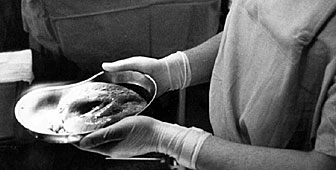Swiss reveal illegal organ trade

A Swiss parliamentarian has revealed evidence of human organ trafficking in one of eastern Europe's poorest countries.
Growing concern over the illegal trade has prompted the Swiss authorities to consider new legislation outlawing the sale of organs, tissues and cells.
The Social Democrat, Ruth-Gaby Vermot-Mangold, on Wednesday presented a report on organ trafficking to the Council of Europe, which wants to see registers of donors introduced in all member states.
In October last year, Vermot-Mangold spent three days in Moldova gathering information about the illegal trade in human organs largely affecting impoverished eastern Europeans.
The report commissioned by the Council of Europe details how victims have been duped into selling their organs in return for a relatively small sum.
It is based on interviews with 14 young Moldovans, who have experienced serious health problems because of a lack of post-operative care.
In one case, a man who agreed to give a kidney for a seemingly large payment now needs a dialysis machine because his remaining kidney was damaged during the illegal operation in Turkey.
Lured to Turkey
Vermot-Mangold – a member of the Council of Europe – was appalled by the extreme poverty she saw during her short visit to Moldova.
“There is a 70 or 80 per cent jobless rate,” she told swissinfo.
“Young people have no jobs, nothing… Many people sell their daughters and women.”
The Swiss parliamentarian found that international racketeers were luring young unemployed men to Turkey with the promise of jobs.
Once there, instead of being given work, the Moldovans were pressured to sell an organ.
According to Vermot-Mangold, the criminal racket in Turkey attracts patients from Israel, Arab countries and increasingly from Europe.
Patients in search of illegal organs also come from Russia, China and the USA, according to Theodor Weber from the Swiss Federal Health Office.
“They do not frequently come from central Europe,” he told swissinfo.
Lucrative crime
Vermot-Mangold’s investigations found the organ sellers received on average $3,000 for one kidney, while the recipients of the illegal transplants paid anything from $150,000 to $250,000 for the operation.
“It is organised crime: you need hospitals, you need doctors and the know-how for transplants,” asserted the Social Democrat.
She told swissinfo that the only way to stop people falling prey to this criminal activity was to “fight poverty in these countries”.
“We also have to fight organised crime in Switzerland,” she added.
“[But] we don’t have enough people, money or political consciousness – we have to do more.”
However, Weber who heads the government’s unit on transplants and research on humans, said Switzerland was not involved in the illegal trade.
He emphasised that Switzerland had an effective legal framework which forbids trafficking in organs.
According to Weber, the existing regulations require “authorisation for organs going over the border” and, in addition, Switzerland works closely with the Council of Europe in this area.
New legislation
On July 7, the House of Representatives commission for social security and health will be discussing a new law on organ transplants, the draft of which forbids the trading of human organs, tissues and cells.
Permission for organ transplants in Switzerland would be extended from donors in the patient’s immediate family circle to include those who have given full, written consent.
But critics say parliament needs to close a loophole through which patients can justify a transplant by claiming they have a distant relative somewhere in eastern Europe.
swissinfo, Tania Peitzker
A 70 per cent post-operative survival rate of around five years has created an increased demand for organ transplants.
There are currently 120,000 patients on chronic dialysis treatment and nearly 40,000 patients waiting for a kidney transplant in western Europe alone.
Fifteen to 30 per cent of patients die on waiting lists, as a result of a chronic shortage of organs.
The waiting time for transplantation, currently about three years, will reach almost ten years by the year 2010.
International criminal organisations have identified this lucrative gap between organ supply and demand, putting pressure on the poor to sell their organs.

In compliance with the JTI standards
More: SWI swissinfo.ch certified by the Journalism Trust Initiative









You can find an overview of ongoing debates with our journalists here . Please join us!
If you want to start a conversation about a topic raised in this article or want to report factual errors, email us at english@swissinfo.ch.